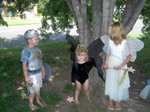 I'd heard all these terms but they were not used in my particular community of Plautdietschers, so I consulted my unassailable source; Norma Jost Voth's "Food & Folkways from South Russia."
I'd heard all these terms but they were not used in my particular community of Plautdietschers, so I consulted my unassailable source; Norma Jost Voth's "Food & Folkways from South Russia."She says about bierocks; "Bierocks, among Molotschna Mennonites, were bread pockets amply filled with a mixture of ground beef and cabbage." I live in Northern Colorado which has a large population of "Germans from Russia", mostly from the Volga region of Russia. This item is really big among this group - when they do a fund raiser, they serve these, now called "cabbageburgers." for the general population and maybe Biroggis. As for "Runza, "there is a fast food restaurant in Loveland, Colorado called "Runza" which serves these"cabbage burgers" almost exclusively. They are part of a small chain with the other restaurant in western Nebraska - also in the midst of a Germans from Russia settlement. I would then say that Bierocks and Runzas are one and the same food. Now the Schweitzer Mennonites (around Moundridge, Kansas) have an important bread pocket dish called Bohnen biroggi which is a sweet bread or roll dough filled with a sweet pinto bean mixture and served with a sweet cream sauce (calories, calories calories.) As to pirogi (or pierogi) they over lap with varenikje except some say that pirogi are baked and varenikje are boiled but then I think it depends who you ask. Varenikje are more closely tied to Mennonites and pirogi are kind of generic for Polish, Ukranian, Russian form of this dish. Read all about Pirogi at http://en.wikipedia.org/wiki/Pirogi.
Of course if you go to the MCC Mid-Kansas Relief sale on the 11th & 12th of April, you can eat your fill of both varenikje and bohnen biroggi - both atthe big Feeding the Multitude meals Fri evening and Sat noon and at stands around the grounds. In addition you can get borscht, Hillsboro sausage, tweeback (called zwiebach by some but tweebach is the Plautdietsch form), and pie. I think around 7000 people are served Friday night and Saturday noon.
I went on the Mennonite Heritage Cruise last fall down the Dnieper River in Ukraine and ate almost all meals on board ship. Several times we were served varenikje, with meat filling, with fruit filling and I think cottage cheese filling but they were only half the size of mothers (and my) varenikje. I assumed this was an indigenous form of this dish. It was most certainly requested by the tour organizers but made their way.
To sum up my view: Beirock = Runza = Biroggis and maybe = Bohnen Biroggi; Pirogi = varenika. These terms seem to be kind of generic and usage, spelling depend on the nation of origin and/or adoption. The form the take also varies by community (even within the Plautdietscher Mennos) We Plautdietscher Mennonites having roots in Prussia, Lithuania, Russia (now Ukraine) etc have picked up dishes along the way and made them our own. We won't even get into Perieschkje; which in our house was square piece of pie dough filled with fruit and formed into a pyramid shaped pocket and baked.
Ron Friesen
Loveland, CO
Loveland, CO
-
Edit: additional information added 03/03/08 at 9:14 pm
-
Another member of one of my mail lists sent this...
-
While I cannot speak to Bierock and Runza, I am somewhat familiar with Piroshki/Biroshki (Pirogi) which was a frequent item on the menu at my parent's table. The item was elongated, often almost a foot long. The ingredients included chopped cabbage and diced ham. Years ago, while in Hawaii, I saw Pirogi on a restaurant menu, I ordered one, think that it would be something similar to Piroshki. What I got was something similar in size to a hotdog bun and little filling (ground meat and cabbage). The flavor was nothing like the Piroshki I was familiar with.
-
I will add more as they come in...













8 comments:
Such interesting research! Now, if only I could taste a bierock myself.
Wow! Such interesting stuff... Always makes me hungry, now, when I come here... lol
We used to have bierocks in the school lunches... and there is a woman who sells them at the farmers market in Pratt occasionally, If I remember right, she's Mennonite...
They are so good!!
Alice - you're in a state loaded with Mennonites, surely there's someone there making bierocks. I realize that they apparently came over with the ones from Russia and not earlier ones that settled in PA, but everyone loves them and they bring in big sales for fundraisers, so I would think someone would have picked up on this in PA. I'll ask my sorces and see if I can find you some there.
Anita - sorry about the food thing, but I find the history of it and what people call it fascinating. I'll get on to other things today. : )
OHHHHHHH VERENIKA!!! Verenika is made with a filling of whey and stuffed into a pocket like pastry/dumpling type of thingy and covered in ham chip gravy!! Oh yum yum yum! I know it is of German origin, and a Mennonite one as well. Some say it is the same as a Pirogi but it isn't. A pirogi is stuffed with mashed potato and cheese and inside a more noodley type of pocket thingy. You should totally try to come to Hutch in April during the Mennonite Relief Sale. They have a humongo German supper with verenika and german sausages and zwieback and oh lordy so much good stuff!! We can't wait for April to come! Oh yeah - now I'm hungry! LOL!
Sigh... HippyChic, I'm not going to be back in town in time for the sale. There's a possiblity that there's going to be a meet-up there of people on my MennoLink mail list (who I've never met but communicated with for years) and I'll be in Fresno. If you noticed in the post from Ron Friensen, he mentions the MCC sale. You really need to plan on coming to our folklore meeting next January. It's all about the food.
I posted my recipe for verenika on my blog!! :)
Found this when I was searching for the difference between piroshki (which we used to buy at a local place in Sonoma, CA) and bierocks,which I just made from a recipe in Cooking Light. Interesting history!
Ellen - Thank you for visiting and leaving a comment. I've been told that every culture has some sort of stuffed bread sandwich. I've also seen a lot debate on the origins of bierocks. :)
Post a Comment